Notes
This article includes a list of references, related reading, or external links, but its sources remain unclear because it lacks inline citations .(January 2014) |
John Weeks Moore (11 April 1807 – 1889) was an American editor of musical publications. He also authored a historical work on early American printers.
Born in 1807 in Andover, New Hampshire, Moore was a son of Jacob Bailey Moore. He was educated at Concord High School and Plymouth Academy, became a printer, and was connected with several journals. In 1834 he established the first musical newspaper in New Hampshire, and he afterward edited The World of Music, a quarto, The Musical Library, a folio, and the Daily News.
This article includes a list of references, related reading, or external links, but its sources remain unclear because it lacks inline citations .(January 2014) |

Charles Francis Adams Sr. was an American historical editor, writer, politician, and diplomat. As United States Minister to the United Kingdom during the American Civil War, Adams was crucial to Union efforts to prevent British recognition of the Confederate States of America and maintain European neutrality to the utmost extent. Adams also featured in national and state politics before and after the Civil War.

Amos Adams Lawrence was an American businessman, philanthropist, and social activist. He was a key figure in the United States abolitionist movement in the years leading up to the Civil War and the growth of the Episcopal Church in Massachusetts. He was instrumental in the establishment of the University of Kansas and Lawrence University in Appleton, Wisconsin.
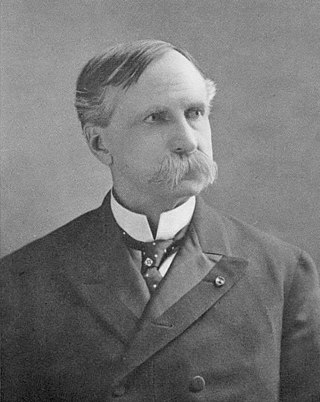
Carroll Davidson Wright was an American statistician. Wright is best known for his title as the first U.S. Commissioner of Labor, serving in that capacity from 1885 to 1905.
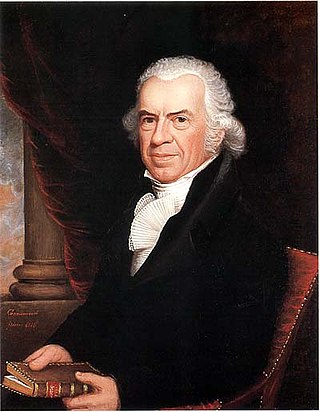
Isaiah Thomas was an early American printer, newspaper publisher and author. He performed the first public reading of the Declaration of Independence in Worcester, Massachusetts, and reported the first account of the Battles of Lexington and Concord. He was the founder of the American Antiquarian Society.
Samuel Adams Holyoke was an American composer and teacher of vocal and instrumental music.

Jacob Harold Gallinger, was a United States senator from New Hampshire who served as President pro tempore of the Senate in 1912 and 1913.

James Grant Wilson was an American editor, author, bookseller and publisher, who founded the Chicago Record in 1857, the first literary paper in that region. During the American Civil War, he served as a colonel in the Union Army. In recognition of his service, in 1867, he was nominated and confirmed for appointment as a brevet brigadier general of volunteers to rank from March 13, 1865. He settled in New York, where he edited biographies and histories, was a public speaker, and served as president of the Society of American Authors and the New York Genealogical and Biographical Society.
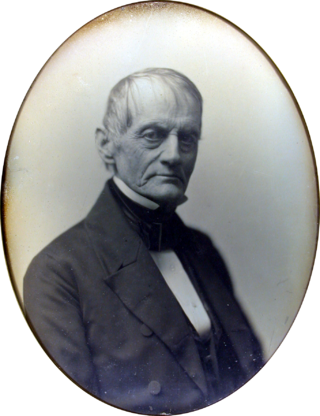
William Appleton was an American businessman and politician from Massachusetts. He was a trader, shipowner, and banker, and served as a U.S. representative from Massachusetts from 1851 to 1855, and again from 1861 to 1862.

George Henry Moore was an American historical writer and librarian.
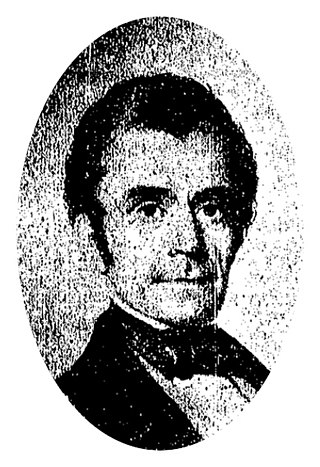
Jacob Bailey Moore was an American journalist, printer, newspaper editor and historical writer.

Peeter van der Phaliesen, Latinised as Petrus Phalesius, French versions of name Pierre Phalèse and Pierre de Phaleys was a Flemish bookseller, printer and publisher. Aside from a number of literary and scientific works, his printing press is mainly known for its publications of music. Phalesius was the principal publisher of music active in the sixteenth-century Low Countries.

Jesse Appleton was the second president of Bowdoin College and the father of First Lady Jane Pierce.
Wesley Bailey was an American newspaper editor and politician from New York.

The New Hampshire Union Leader is a daily newspaper from Manchester, the largest city in the U.S. state of New Hampshire. On Sundays, it publishes as the New Hampshire Sunday News.

William Trotter Porter was an American journalist and newspaper editor who founded an early American newspaper devoted to sports. After working at a number of small newspapers, Porter moved to New York City in the 1830s. After employment at a newspaper in the city, he founded the Spirit of the Times, a newspaper modeled on a London paper called Bell's Life in London. The Spirit, which went through a number of names and incarnations over the years, was devoted to sports and other recreational pursuits. One of Porter's main interests involved horse racing, and he was involved in attempts to create the first stud book in the United States, which did not bear fruit. He was also instrumental in the development of American literature, as the Spirit published a number of short stories by American tall tale writers, and Porter edited two collections of short stories by American writers. After publishing the Spirit through the 1830s, he sold it to another printer but continued as the editor into the 1850s. He left the original Spirit in 1855 and in 1856 was hired as editor for another sporting newspaper, Porter's Spirit of the Times, published by George Wilkes. Porter died in 1858.

Samuel Lancaster Gerry (1813–1891) was an artist in 19th-century Boston, Massachusetts. He painted portraits and also landscapes of the White Mountains and other locales in New England. He was affiliated with the New England Art Union, and the Boston Artists' Association. In 1857 he co-founded the Boston Art Club.
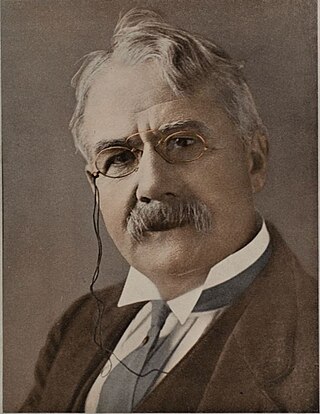
Frank Lebby Stanton, frequently credited as Frank L. Stanton, Frank Stanton or F. L. Stanton, was an American lyricist.

Rev. Ransom Dunn, D.D. was an American minister and theologian, prominent in the early Free Will Baptist movement in New England. He was President of Rio Grande College in Ohio, and Hillsdale College in Michigan. A Discourse on the Freedom of the Will is one of his most notable works.

James Madison Rix was an American newspaper printer editor, politician and lawyer who served as the President of the New Hampshire Senate.

Bibliography of early American publishers and printers is a selection of books, journals and other publications devoted to these topics covering their careers and other activities before, during and just after the American Revolution. Various works that are not primarily devoted to those topics, but whose content devotes itself to them in significant measure, are sometimes included here also. Works about Benjamin Franklin, a famous printer and publisher, among other things, are too numerous to list in this bibliography, can be found at Bibliography of Benjamin Franklin, and are generally not included here unless they are greatly devoted to Franklin's printing career. Single accounts of printers and publishers that occur in encyclopedia articles are neither included here.